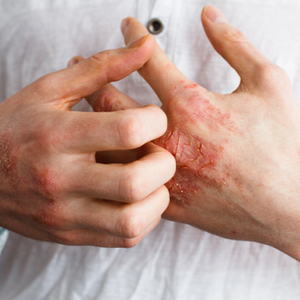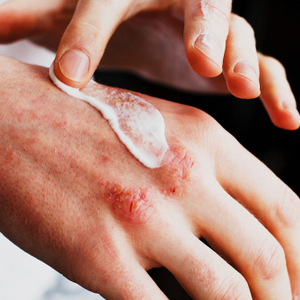Quick Links
A substantial proportion of the US population shows symptoms of eczema at some point in their lives, particularly in childhood. Exact figures are hard to know because many will treat their dry skin at home and won’t consult a physician unless their symptoms persist or fail to improve. In addition, the term covers a large group of diseases and can vary in severity. If it is not effectively treated it can lead to additional problems with your skin like infection from excessive scratching.
What is Eczema?

Eczema can be thought of as an allergy, like asthma or hay fever, where certain stimuli will trigger the skin to produce an inflammatory rash. For example, contact eczema (more commonly known as Contact Dermatitis) is a mainly localized reaction where the skin reddens when it is exposed to a specific irritant or allergen. This can be as innocent as a bar of soap, mild detergent, or cosmetic product. Some people may work in industries where they are exposed to even stronger chemical irritants. Others may develop an allergy to metals like nickel which turn their jewelry, jean studs, zippers, and watch straps into eczema-causing triggers.
Eczema can occur on almost any part of your body such as the face, hands, fingers, legs, and feet. Other common locations are arms, ears, and elbows. Some people suffer eczema around the eyes and on their eyelids which needs to be carefully treated. The duration of the condition can be variable. Short-term episodes are termed “acute” while the long-term condition is known as “chronic”.
What Are The Different Kinds of Eczema?
A Trillium Creek Dermatologist is equipped to help you overcome this uncomfortable condition. The first step is to identify the type of eczema that you have. You may hear terms such as eczema nummular, eczema xerosis, or eczema herpeticum.
The names can be confusing, but they are simply medical terms used to distinguish the specific location, appearance, or aggravating factors that can trigger your eczema. Your skin specialist will explain these terms so that you fully understand what they mean.
The important thing is that the type of eczema you are suffering from is correctly diagnosed so that the most effective treatment plan can be set up for you. It is also necessary to ensure that your condition is, in fact, eczema and not psoriasis. This is a different skin condition that does not have the same underlying cause, so it needs to be treated in a different way.
Although it is a common condition, the exact cause of eczema continues to stir up medical debate. There appears to be a genetic link but other things such as your environment, your immune system and the make-up and sensitivity of your skin structure can all play a role.
Eczema in Infants
Baby eczema is very common, though the condition affects young and old alike. Eczema can also be known as dermatitis which means inflammation of the skin. The term comes from the Greek word “ekzein” which means “to boil”.
Treatment for Eczema

Your Trillium Creek Dermatology skin experts may prescribe a number of treatments including moisturizers, topical steroids, oral steroids, and more advanced medications depending on the severity of your condition.
Treatment includes special creams and lotions for everyday use, including special eczema shampoo, soap, body wash, and face cream.
Your visit to Trillium Creek Dermatology will include an assessment of any factors that may be aggravating your skin condition. Our skin experts will recommend simple but effective changes that you can make to minimize the chances of your eczema becoming a long-term chronic problem that adversely affects your life.
Eczema and Dry Skin can significantly reduce the quality of your life. A dermatologist, a trained skin expert, can help you better manage your skin condition and avoid complications. When you need help with your skin, please call 330.725.0569 to set up an appointment with a Trillium Creek Dermatology provider today. We are serving the following communities and those surrounding: Wooster, Wadsworth, Medina, Brunswick, Strongsville, and Hinkley.
Frequently Asked Questions
What is the Main Cause of Eczema?
Researchers are still unsure of what the exact cause of eczema is. It is thought to be linked to an overactive immune system that responds to an irritant. Eczema is commonly found in families with histories of allergies or asthma.
Can You Get Rid of Eczema?
Unfortunately, there is no cure for eczema. However, treatments for eczema can help to heal the affected skin and prevent future flareups. Your doctor at Trillium Creek will plan treatment based on age, symptoms, and overall health.
How Long Does Eczema Last?
The length of eczema varies for each patient. Some people experience it for years whereas others only experience it for a short period of time. It is highly dependent on the type of eczema and its response to treatment.



